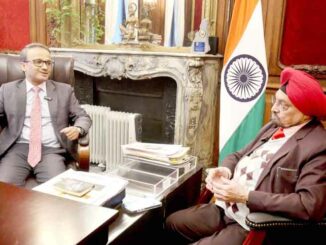
WASHINGTON, D.C. (TIP): Calling the much sought-after H-1B visa system “indentured servitude”, Indian-American GOP presidential candidate Vivek Ramaswamy has pledged to get rid of it if voted to power in 2024, the Politico reported. Having himself used the system 29 times in the past to hire highly-skilled professionals for his pharma company, Ramaswamy said that the temporary worker visas system is “bad for everyone involved”, and the US needs to eliminate chain-based migration. “The lottery system needs to be replaced by actual meritocratic admission. It’s a form of indentured servitude that only accrues to the benefit of the company that sponsored an H-1B immigrant. I’ll gut it,” Politico quoted the 38-year-old entrepreneur as saying.
“The people who come as family members are not the meritocratic immigrants who make skills-based contributions to this country,” Ramaswamy, born to immigrant parents from Kerala, added.
The US Citizenship and Immigration Services approved 29 applications for Ramaswamy’s former company, Roivant Sciences, to hire employees under H-1B visas from 2018 through 2023, the report said.
“As the largest organization of members currently on H1B visa stuck in green card backlogs, we completely agree with @VivekGRamaswamy & others willing to speak the truth: H1B visa is, in fact, indentured servitude that only benefits the company that sponsors the visa, but is bad for everyone else. We agree — it is time to gut H1B,” US-based non-profit, Immigration Voice, wrote on X (formerly Twitter).
Stating that Ramaswamy has grabbed headlines for his restrictionist immigration policy agenda, the Politico said that “his rhetoric has at times gone farther than the other GOP candidates, as he calls for lottery-based visas, such as the H-1B worker visas, to be replaced with ‘meritocratic” admission’”.
He has also said that he would deport US-born children of undocumented immigrants.
The H-1B visa allows companies and other employers in the US to temporarily employ foreign workers in occupations that require the theoretical and practical application of a body of highly specialized knowledge and a bachelor’s degree or higher in the specific specialty, or its equivalent.
Every year the US gives 65,000 H-1B visas open to all and 20,000 to those with advanced US degrees.
Indians are the biggest beneficiaries of the H-1B visas getting about 75 per cent of them, according to the US government. In July 2023, Indian-American Congressman Raja Krishnamoorthi introduced legislation proposing to double the annual intake of foreign workers on H-1B visas from 65,000 to 130,000.
Earlier this year, bipartisan legislation was introduced in the US Senate to reform and close loopholes in the H-1B visa programme, created to complement America’s high-skilled workforce.
(Source: IANS)





There are 2 ways to fix this, start a U.S. apprenticeship, for all students and the unemployed. Give the companies that 15% tax break (for 3 years) we give only to foreign students in the U.S. This will put locals and foreign worker on the same playing field. Both indentured (if the local leaves before 3 years, they pay the 15% tax back to the U.S. government).
Second, make H-1b (and OPT) a merit based visa, similar to the Green Card system. If there are locals that can do the job, they get the job, otherwise get the now verified as needed person in.
There were 400,000 legitamite H-1b visa applications. Meaning 400,000 job offer to foreign workers, at a time when U.S. tech companies laid off 250,000 engineers. Clearly, there is a preference for people who are stuck in the H-1b and Green Card systems, who stick with their employer because they don’t have full (U.S.) 13 amendment rights.
Facebook laid off local AI engineers in 2022. There are easily retrainable engineers. And clearly there is a preference for people who are stuck at the company, they are the ones worth retraining. Turns out though, that is job discrimination, you can’t use Visa status as factor when determining who gets laid off.